Out Now! Confessions of a Reluctant Writer
I’ve never wanted to write a play. Ever. I flirted with being a poet in college and for a short time considered trying to make a go of it, but it soon became obvious that the only choice available to poets was to either become a professor or some kind of exotic hobo. Lacking the natural aptitude for a career in academia and fearful of my success as a hobo, I dropped the whole idea of becoming a poet. And when I fell into directing for the theater, I gave up the idea of writing altogether.
For thirty years I was happily consumed by the challenges of being a director. Since my main focus was on new work, I spent a considerable amount of time with playwrights. Young, old, emerging, established: a wide variety of stripes and types. And the more time I spent with these brave, intrepid souls, the less desire I had to ever write a play.
Don’t get me wrong, my admiration was enormous. The sheer difficulty of writing a good play has never been lost on me, and I was frequently astonished by the talent, skill, and imagination exhibited by many, many writers. But the professional options seemed too meager and the obstacles beyond formidable. Too little control. Too few opportunities. Too much like solitary confinement. Between the time it took to write a play and my own extroverted nature, it did not seem like I was well suited to the task.
Sometime during the throes of mid-life I started feeling the need to scare myself into doing something different. Not to simply feel something new, but to feel something deeper.
But circumstances, as they say, conspired. Sometime during the throes of mid-life, I started feeling the need to scare myself into doing something different. Not to simply feel something new, but to feel something deeper. A handful of artistic questions and a smaller handful of personal traumas forced me to seek some solitude: not in a monastery but in my everyday life. I wasn’t looking for a religious practice but a new imaginative exercise. I was tired of myself, tired of my voice, and I wanted to see if I could unearth a different mode of expression. I wanted to be with myself in a new way.
And so I turned to writing. Not playwriting, mind you. I went back to poetry and then concentrated on a book of comic short stories, mainly about my lovely, crazy family. For a few years I wrote in blissful secrecy, with only a few select friends and chagrined relatives as my loyal readers. Honestly, I have to say, that it was joyful. It started out feeling like therapy and ended up feeling like, well, writing. I fell in love with words again. The feel of them, the flow, the way they appeared and then vanished, their illusion of making fantastical sense and their capacity for creating fabulous nonsense.
My master plan seemed to be working. I was a writer with no desire to call myself a writer, free of any expectations or responsibilities or obligations. And I felt like I was accessing a part of myself that had been dormant for a long time. The situation was perfect. But then, like some pathetic character in a Grimm’s fairy tale, I started getting greedy. Maybe I should show some of my material to a wider circle of people? Maybe submit it to a publisher? Maybe publish a book or three?
To complicate matters, I was separately approached by two theater colleagues about projects which had no writer attached. Rita Moreno was searching for someone to help tell her life story, and Jon Moscone wanted to make a fictional play inspired by his personal experience following the assassination of his father. With no agenda other than helping to facilitate, I started taking notes for both of them. A ton of notes. Structures for both plays began to appear in my mind, and during one fateful week while on tour in Montreal, I found myself writing snippets of dialogue.
I kept at it. The snippets turned into scenes. Eventually whole acts appeared. And to my utter shock, I loved it. Maybe it was the adrenaline rush or my own arrogance, but, to make matters worse, I thought some of it was pretty good. For a guy who never wanted to write a play, I was now writing two of them simultaneously.
D-Day arrived. I called both Jon and Rita. Told them I thought was onto something and would they like to see my first rough drafts? “Of course,” they replied, “sounds terrific!” So I sent the material and waited. I can’t tell you how excited I was. I was in the throes of a creative breakthrough, and I was sure that whatever criticisms they each had, that they would be equally thrilled.
I was glued to my phone. I checked for incoming messages roughly every three minutes. Soon I’d be hearing from them. “Oh my god,” they’d babble, “this is amazing! How did you do it?” But the minutes turned into hours. Jesus, did they not get the scripts?
One full day went by. Then two. My body went into high anxiety mode. I became frustrated, then worried, then angry. By the fifth day I was apoplectic. I called and left messages. I emailed. Fuck! They were ignoring me! Don’t they get it? I’m out on a limb here! I need feedback!
One week. Two weeks. Come on! Couldn’t at least one of them get back to me? Maybe they were conspiring; had they called each other to compare notes? They obviously hated the material but couldn’t bring themselves to tell me. I was sure that both projects were dead in the water. In the span of fourteen short days I experienced an unbearable cycle of feelings that completed my makeover. I could no longer ignore the obvious. I had become a writer.
Those two weeks were the most instructive experience I’ve had in my very brief career as a playwright. It didn’t matter that my years as a director and producer provided me with every possible explanation for the delay in Rita and Jon’s response. They were swamped. They were in rehearsal. They were dealing with a personal crisis. They couldn’t open the attachment. They finally did open the attachment only to discover that it was empty. They had to wait to read until they were in the proper frame of mind…. Whatever rational reason they had for not getting back to me, my feeling of being spectacularly vulnerable colored my entire experience. I’m done with this whole thing, I thought.
Fuck this.
I finally got a hold of Jon. “I’m sorry, I’m terrified to read it,” he said. “I promise you I’ll read it tonight.” I hung up the phone, dumbfounded. I tried to call Rita. No answer. A short while later she got word to me through an intermediary. Turns out she did hate it. Thought it was all wrong. But a few weeks later she called me to tell me she’d changed her mind. That her own fear about telling her story prevented her from seeing what was there. “I’m finally excited,” she laughed, “When can we go over the script? I have a lot of questions for you.”
Minutes later, Jon called to say that he finally read the draft. “When can we talk?” he asked. “I have a lot a notes.” Until that moment, I’d never had the experience of laughing and crying at the same time.
Three years later, after a total of six workshops and fifteen drafts, both plays opened within a few weeks of each other. It’s been quite a ride, this playwriting thing. Harder and more satisfying than I ever imagined. What’s hard is the lack of control when you get into rehearsal. And not speaking for long stretches of time. And the feeling of awkwardness that comes when you’re not there all the time and then you show up one day and everyone is scared and trying not to be scared and you’re scared and trying not to show you’re scared and…
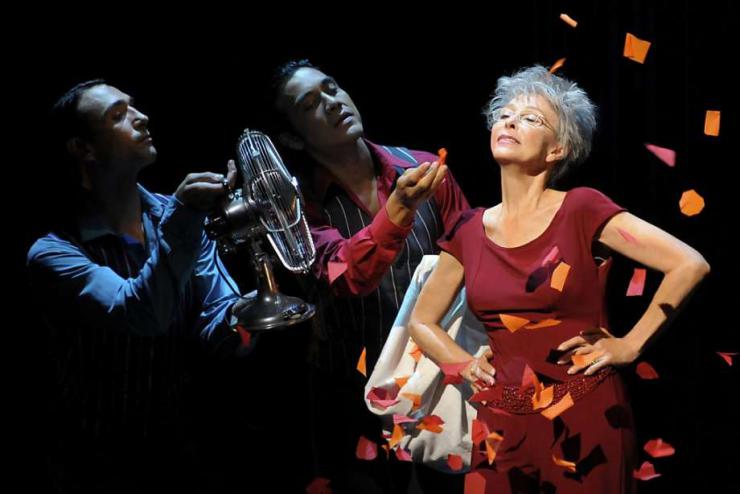
What’s satisfying is hearing and seeing what you wrote in the hands of gifted artists, the feeling of humility and pride at the astonishing collective effort to make manifest what you dug up from the recesses of your brain. And then, when it works…
But the best part is just writing. The digging through the basement of your entire life in search of someone else’s. And stumbling onto something that feels alive. Even a bit real. Connected to yourself but way beyond you. The best part about it is making up stuff.
You know, I’m still hesitant to call myself a writer. But I have to say, on a good day, I’m one step closer to feeling like an artist. I’ll take that deal. On any day.

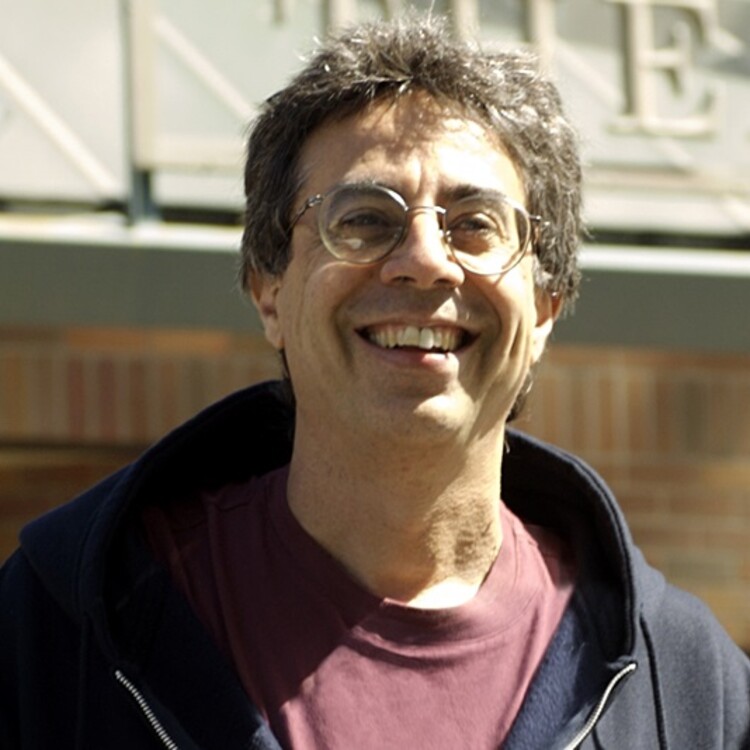
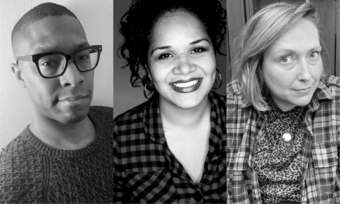




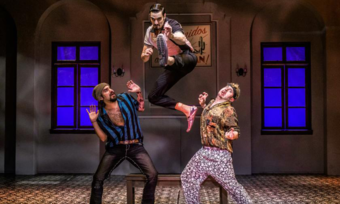


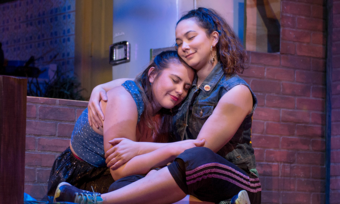


Comments
The article is just the start of the conversation—we want to know what you think about this subject, too! HowlRound is a space for knowledge-sharing, and we welcome spirited, thoughtful, and on-topic dialogue. Find our full comments policy here
Great stuff,Tony. (I auditioned for you many years ago in S.F. and have been writing plays now, here in NYC, for the past ten). Thanks,
WPM
There are so many take-aways from this story, but mostly, i admire both Tony and Jon so much for embracing fear and not letting it get in the way.
who is this jon moscone and why didn't he get back to this taccone writer sooner? what nerve. how can he possibly be more concerned about reading the words culled from hours and hours of divulging on-the-couch therapy sessions, words that started in his mouth, mind, heart and blood; then flew into the mouth mind heart and blood of another only to see them again, in the light of day, paginated and arced? i'll tell you why - making new work that is personal in ways that surprise even the most personal of writers is TERRIFYING, pure and simple. but tony took everything and mixed it into his swirling, blisteringly smart brain and braved the waters of early response to build a work that is as far away from my reality as it is true to the core of the pain of loss that i felt. i have more admiration for him than i ever had in all the years i've had the honor of having him in my life.
but let's be clear - it's scary on both sides - we're all putting our guts on the line when new work is being made, writers, developers, creators, directors, artistic directors, everyone. there is a sequencing of the 'fear code' - it begins with one person, transfers to another, then another, then back again. the risk of making new work is undeniably huge, and only through bravery and vulnerability, allowing someone else to suffer while you support in the hopes that he/she will do same for you, and trusting that all that matters is that we give birth to something thrilling, filled with undeniable life, with a vital dna, messy, not perfect, but living, breathing and ready for more work, more shape in ensuing productions. it's a glorious, daunting excursion, one that each one of us has the right to embark upon. for myself, i am one lucky man to have had tony as partner, in the lead, then behind me, but ultimately, beside me all the way.
I have to say I am absolutely delighted that Tony has decided to open up this new identity for himself - not the least that he reveals a charm and wit in his writing that is just delicious - like a Noel Coward with even more humanity... having recently been able to finally spend more in person time with him, I realize that wit, charm and humanity is very much part of who he is and it's great to see it shared more widely in his work as a writer...
Hope to have more contact with both incarnations in future.
shit, I guess I should have started writing sooner...
I'd say it's definitely different giving notes as a writer, and very hard for me not to blend those notes into "directorial" notes. I think like a director, of course, so it's second nature for me to respond that way.
I tried really hard with Jon not to cross lines, but you'd have to ask him if I was successful or not. I think he'd probably say "sometimes". Hopefully, he'd laugh as he said it.....
t
Thanks for diving into this, Tony. I would love to know if your experience, particularly with that "waiting period", has moved you to think differently about how you relate to writers as an Artistic Director? Or if being on the receiving end of the notes has impacted your approach to delivering them? There's so much in the conversation about the divide between the playwrights and the "institutions" but we hear so little from the Artistic Directors on this front. Perhaps you, Carey Perloff, Emily Mann, Chay Yew and Kwame Kwei-Armah should do a long session somewhere about this.
'I was tired of myself, tired of my voice, and I wanted to see if I could unearth a different mode of expression. I wanted to be with myself in a new way."
well put, and what a sentiment.
thanks for the great article, Tony.
-Joanna
PS: sitting in a rehearsal room being quiet DOES sound very hard :)
man, there are times I have to put tape over my mouth...
you have to let people do their work....give them time to find it...
and also give them a chance to surprise you.
that being said......
t
Thank you for this Tony! I love how you describe the feeling you get when you haven't heard back from collaborators regarding a draft of your work. Even though you know every possible reason they haven't gotten back to you - you still assume the worst. It's such a painful but beautiful process. Cheers!